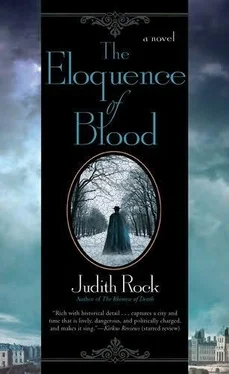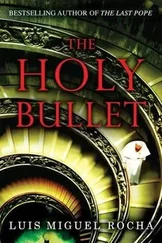Judith Rock - The Eloquence of Blood
Здесь есть возможность читать онлайн «Judith Rock - The Eloquence of Blood» весь текст электронной книги совершенно бесплатно (целиком полную версию без сокращений). В некоторых случаях можно слушать аудио, скачать через торрент в формате fb2 и присутствует краткое содержание. Жанр: Исторический детектив, на английском языке. Описание произведения, (предисловие) а так же отзывы посетителей доступны на портале библиотеки ЛибКат.
- Название:The Eloquence of Blood
- Автор:
- Жанр:
- Год:неизвестен
- ISBN:нет данных
- Рейтинг книги:5 / 5. Голосов: 1
-
Избранное:Добавить в избранное
- Отзывы:
-
Ваша оценка:
- 100
- 1
- 2
- 3
- 4
- 5
The Eloquence of Blood: краткое содержание, описание и аннотация
Предлагаем к чтению аннотацию, описание, краткое содержание или предисловие (зависит от того, что написал сам автор книги «The Eloquence of Blood»). Если вы не нашли необходимую информацию о книге — напишите в комментариях, мы постараемся отыскать её.
The Eloquence of Blood — читать онлайн бесплатно полную книгу (весь текст) целиком
Ниже представлен текст книги, разбитый по страницам. Система сохранения места последней прочитанной страницы, позволяет с удобством читать онлайн бесплатно книгу «The Eloquence of Blood», без необходимости каждый раз заново искать на чём Вы остановились. Поставьте закладку, и сможете в любой момент перейти на страницу, на которой закончили чтение.
Интервал:
Закладка:
La Reynie nodded, and they made their way in silence up the narrow path between the old houses. The gathered women, quiet now, were still standing in the rutted little dirt street.
“Mesdames,” La Reynie said, sweeping off his white-plumed hat, “where might I find Reine now?”
The women traded looks and the eldest said, “Probably at The Procope, monsieur.”
“I thank you. And my thanks to you especially, madame,” he added to the wood seller, “for sending to the barriere for the sergent. He is going to ask you and your friends to keep people from the path here for a short while. I hope you will oblige him.”
To Charles’s surprise, these poor, lowborn women did not curtsy to La Reynie. They simply nodded regally, and La Reynie nodded respectfully in return and replaced his hat.
“I find it interesting,” he said, as he and Charles walked away, “that men mostly ignore each other until someone’s honor is threatened. But women! They ignore nothing and so they know everything that goes on in a quartier. I could not do my job without them.”
Charles murmured acknowledgment, but his thoughts were across the river. “Are you going to the Capuchins to look for Gilles Brion?”
“Not yet. If young Brion killed his father and fled, he is gone. If he is still at his prayers, the sergent will find him easily enough. We are going to Procope’s coffeehouse.”
The thought of hot fragrant coffee nearly brought tears to Charles’s eyes. But Jesuits did not go to coffeehouses and La Reynie knew it.
“That is a wickedly tempting suggestion, mon lieutenant-general. You know I cannot sit in a coffeehouse.”
“The Society of Jesus forbids tobacco, not coffee. If the head of the Paris police compels you to sit in a coffeehouse, you can sit there. Two sets of eyes and ears are better than one.” He smiled a little. “Even if the one is me.”
Chapter 10
Procope’s coffeehouse was in the rue des Fosses St. Germain, west of Louis le Grand and near where the old wall curved north to meet the river. The rue des Fosses was part of the ongoing effort to free Paris from its walls and make it a modern, open city. The old, towered stone walls were being slowly leveled and the defensive ditches on either side filled in to make wide, somewhat raised promenades planted with trees. On the Right Bank, the walls had come down quickly, but on this side of the river progress was slow, as progress always seemed to be on the Left Bank.
Francesco Procopio dei Coltelli’s coffeehouse was a world away from the ditch where Henri Brion’s body lay. Charles expected to see the beggar woman called Reine sitting at its door, but no one was there and La Reynie led the way inside. Everything about Procope’s had the glitter of success. Its walls were hung with tapestry, paintings, and even a mirror. Graceful chandeliers with crystal pendants hung from the ceiling, banishing the morning’s grayness. Well-dressed men sat at round tables, sipping coffee from bowl-like cups. Many were absorbed in books and news sheets, while others played cards or talked and argued in low voices. An enormous brass kettle with a spigot warmed at the front of the fireplace, and a waiter dressed a la Armenien, in a red-and-gold turban and a long embroidered robe, moved through the room, refilling cups from a long-spouted silver pot.
A woman of fifty or so, in a high-necked gown of sober black, collected the money and kept watch over the proceedings from a half-walled counter near the fireplace. Her eyes widened as she recognized Lieutenant-General La Reynie, and she hurried out of her little fortress, her tall white fontange headdress quivering like the erected crest of a startled bird. At the clattering of her low heels on the diamond-patterned floor tiles, a dozen men looked up to see who had come in and a ripple of silence followed her across the room. With a disapproving glance at Charles, she curtsied to La Reynie.
“You are welcome to The Procope, monsieur.”
“Thank you, madame.” La Reynie smiled widely. “May I take it from your welcome that we no longer have a quarrel about your closing time?”
Her lips smiled back, but her small black eyes were cold as she said, “Naturally we have no quarrel. You will find, if you stay so long, that we close and lock our door at six, exactly as required. Would you care to sit by the fire, monsieur? There is a table there.”
Charles waited for La Reynie to explain that they were there on business, but the lieutenant-general only looked questioningly at him, as if a table by the fire or not were the extent of his worries on earth.
“That would be a great gift, madame,” Charles said sincerely.
Eyes followed them as the woman led the way to a warm corner hung with red-and-blue tapestry. She beckoned the waiter to them, curtsied again, and returned stiff-backed to her post. The turbaned and gowned young waiter had liquid dark eyes and a scattering of pockmarks. He bowed elaborately.
“What is your pleasure, messieurs? I can offer you coffee of the best, or chocolate in the Spanish style, or spiced limonade. Or one of our frozen waters, since you are sitting so warmly. We have anise, orange, cinnamon flower, frangipani, and barley. And our cakes and wafers are the freshest and most toothsome in Paris!”
La Reynie ordered coffee and cakes for two, and the waiter sped gracefully away.
“What about the beggar?”
“Wait. We’ll watch a little first. The word will be out that the body has been found. We may not be the only ones wanting to speak to Reine.”
“Ah.” To keep up the appearance of polite, nothing-saying talk, Charles said, “I know Signore Procopio is Sicilian. Are the rest of them Sicilian, too?”
“Yes, mostly. Procopio’s relations. It’s always a good idea to employ relations, because you can pay them nothing. Very Italian.” La Reynie grinned. “Also very French.” He raised his eyebrows slightly at Charles. “And now let us survey our fellows. When our coffee comes, we will enjoy it like tired men glad to be silent and listen to others talk. Before we move on to other things.”
As Charles let his gaze wander the room, he realized that no pipes were in evidence. “No tobacco here?” he whispered, surprised.
La Reynie shook his head. “No. In some others, but not here. I don’t think the French will ever hide themselves in a reeking fog of tobacco smoke as the English do. Also, Procopio welcomes women-escorted, of course-and women will not come if the air is foul.”
This morning, though, there were only men at Procope’s.
“Recognize anyone?” La Reynie asked softly.
Charles shook his head. “Do you?”
La Reynie looked surprised, for once. “Of course I do, I recognize half of them. For what that’s worth. Probably not much. Most of our fellow idlers have probably done nothing worse than lie to their wives and refuse to pay their tailors.”
The coffee arrived, along with small almond-flavored cakes. Charles had drunk coffee before, but not often. He breathed in its fragrance and drank deeply, sighing with pleasure as he set his cup down and thinking that this was worth penance. He picked up a cake and went back to watching the room. Most of the interest in the newcomers had subsided. Aside from two or three men eyeing them and leaning toward each other as they talked, their presence didn’t seem to be much bothering anyone. La Reynie took off his cloak and turned his chair so that he could stretch his black-stockinged legs in front of him. He sipped his coffee contentedly, seemingly oblivious of everything else.
Charles ate a cake and scanned the wall across from them without moving his head. The instinct that had kept him alive during the Spanish Netherlands war was telling him they were being watched, and too intently. From the barely open door, he guessed, which probably led to the kitchen. Seeming to study a shelf above the door that was lined with glowing copper pots graduated in size like a fertile man’s family, Charles murmured to La Reynie, “Someone beyond that door across the room is very interested in us.”
Читать дальшеИнтервал:
Закладка:
Похожие книги на «The Eloquence of Blood»
Представляем Вашему вниманию похожие книги на «The Eloquence of Blood» списком для выбора. Мы отобрали схожую по названию и смыслу литературу в надежде предоставить читателям больше вариантов отыскать новые, интересные, ещё непрочитанные произведения.
Обсуждение, отзывы о книге «The Eloquence of Blood» и просто собственные мнения читателей. Оставьте ваши комментарии, напишите, что Вы думаете о произведении, его смысле или главных героях. Укажите что конкретно понравилось, а что нет, и почему Вы так считаете.












